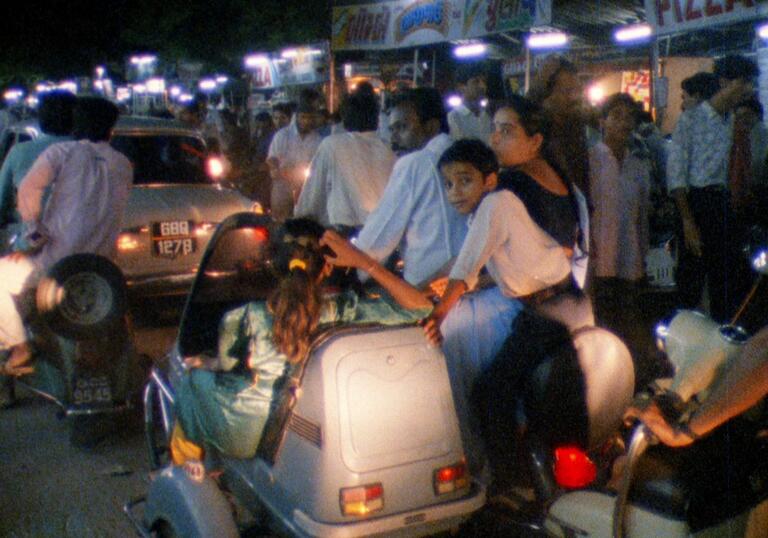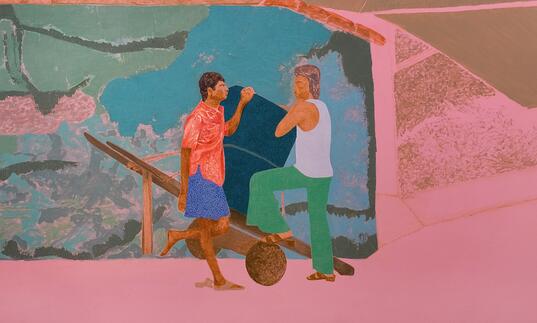
A programme of experimental films that map the post-colonial experience through the artist’s lens.
Exploring youth culture, feminist solidarities and urbanisation, this line-up comprises four films. This Bit of That India (1972) is a subversive state-sponsored documentary promoting research at Indian universities, while Tambaku Chaakila Oob Aali (1982) traces the history and strike actions of the all-women trade union of over 3,000 tobacco workers in Nipani (Karnataka).
Part first-person diary, essay film and film-poem, Memories of Milk City (1991) is an unconventional portrait of Ahmedabad city; rounding out the programme, Sudesha (1983) is a documentary profile of a woman activist in the Chipko forest conservation movement in the foothills of the Himalayas, made by an Indian feminist film collective.
Programme curated and video introduction by curator Shai Heredia.
Please note: sections of the first film in the programme contain images of animal vivisection that some may find upsetting.
This is a past event. Subscribe to our newsletters to hear about upcoming events
Booking fees
£1.50 booking fee per online/phone transaction.
No fee when tickets are booked in person.
Booking fees are per transaction and not per ticket. If your booking contains several events the highest booking fee will apply. The booking fee may be reduced on certain events. Members do not pay booking fees.
Programme
This Bit of That India (India 1972 Dir SNS Sastry 20 min English) This Bit Of That India is a layered refection on youth culture, diversity, progress, education, technology and sexuality. The film juxtaposes documentary moments that celebrate individual freedom with a theatrical performance of Federico Garcia Lorca’s The House of Bernarda Alba, as a metaphor for repression and conformity.
Tambaku Chaakila Oob Aali (India 1982 Dir Yugantar Film Collective 25 mins Marathi with English subtitles) Made by the Yugantar film collective in collaboration with female tobacco factory workers, Tambaku Chaakila Oob Aali documents, re-enacts and takes forward one of the largest movements of unorganised labour of its time and context which sparked unionising processes across Karnataka and Maharashtra throughout the 1980s.
Memories of Milk City (India 1991 Dir Ruchir Joshi 13 min English, Bengali & Hindi with English subtitles) A fourteen-minute cine-poem, Memories of Milk City catches Ahmedabad at a time of transition, peeling away layers of textures, gestures and sounds, tripping over a culture and a language at war with themselves.
Sudesha (India 1983 Dir Yugantar Film Collective 34 min Hindi and Garhwali with English subtitles) Sudesha tells the story of a woman who is a village activist in the Chipko Forest Conservation Movement in the foothills of the Himalayas. In this area, people depend entirely on the forest for their daily needs of firewood, food, and water. But the forests have been destroyed by powerful timber traders—and along with the forest, the livelihood of the people has been threatened.
Curator
Shai Heredia is a filmmaker, curator, and founding director of Experimenta, the moving image art biennial of India. She has curated film programs and exhibitions worldwide and was the programmer of the 65th Robert Flaherty Seminar. Heredia has co-directed I Am Micro (2012) and An Old Dog’s Diary (2015) which have exhibited at prestigious film festivals and art venues internationally. Both films have been critically acclaimed and won awards including a National Film Award and a BFI London Film Festival award. Heredia is currently the co-curator of Forum Expanded, Berlinale.
Heredia has contributed to journals such as The Moving Image Review and Art Journal and PUBLIC, and was the co- editor of the Loud Mess issue of NANG magazine. Her latest book One Film at a Time has been published by Arsenal Institut for Film and Video Art.
Related events

Pioneering Indian Cinema after 1970

Art 1975–1998
Give a year of art, music, film and theatre
Cinema 3
Location
Barbican Cinema 2 & 3 are located on Beech Street, a short walk from the Barbican’s Silk Street entrance. From Silk Street, you’ll see a zebra crossing that will take you across the road to the venue.
Address
Beech Street
London
EC2Y 8DS
Public transport
The Barbican is widely accessible by bus, tube, train and by foot or bicycle. Plan your journey and find more route information in ‘Your Visit’ or book your car parking space in advance.
We’ve plenty of places for you to relax and replenish, from coffee and cake to wood-fired pizzas and full pre-theatre menus
Access
Cinemas 2 & 3 are located at Beech Street, a short walk from the Barbican Centre’s main Silk Street entrance. There are a couple of steep, dropped kerbs and an incline to negotiate between the two sites. Level access from Beech Street.
Mobility
Each auditorium has three permanent wheelchair spaces (two in the third row and one in the front row) and 153 fixed seats with capacity for a further three spaces in the front row. Access to each auditorium is up a ramp. There are also a number of seats with step-free access.
Assistance dogs
Assistance dogs may be taken into the cinema – please tell us when booking to ensure your seat has enough space. If you prefer, you may leave your dog with a member of the foyer staff during the performance.
Hearing facility
An infrared system for hard of hearing customers is provided in each auditorium; headsets or neck loops can be collected from foyer staff. The ticket desk counter is fitted with an induction loop.
For more access information, please visit our Accessibility section.





